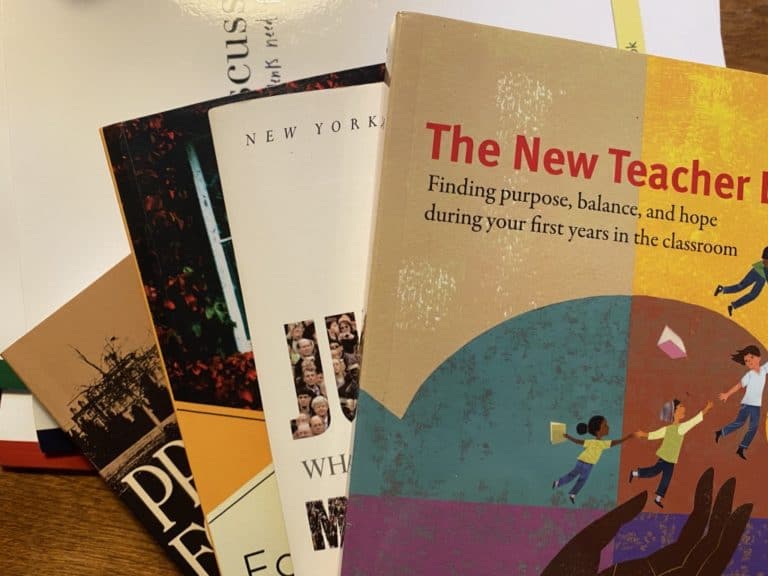Gen Z Thoughts on Technology & Mental Health
We talk – often – about the negative ramifications today’s teens face of living in a screen-bound world. We postulate about the impact of ever-increasing screen time and ever-improving technology on teens’ mental health, their attention spans, and their conversation skills. We theorize about kids’ “addictions” to their phones, to social media, to screens.
As much as we speculate, though, we can’t truly understand the push and pull of technology that today’s teens face. As adults, we’re not digital natives living in that tech-centric world.
Who does live in that world? Our fantastic R.E.A.L.® college interns. The team recently had a candid conversation about the tension between abundant technology and mental health. Here’s what we learned.
How are young people grappling with the challenge of being always “on”?
Technology presents multiple benefits: impressive access to information, unparalleled convenience, and even constant connection with friends and loved ones. These positive factors, though, can also have a negative side: our interns report that the glut of information and connection available via smartphone can leave them feeling anxious, inattentive, and overloaded with information.
“I’ve realized how much social media and being on our phones has had an influence on my perception of self, others, and the world, which can be very damaging,” says Intern Program Director Francesca Chirco. “I think it’s important to notice this and remind myself whenever I start comparing my life to others.”
“I’ve also noticed that I have a hard time being present when talking and hanging out with my friends,” says Francesca. “I find myself playing CandyCrush or looking at Instagram instead of being present. Sometimes, my friends are talking about serious topics, and it could come off as if I’m not listening.”
The constant distractions technology offers not only tarnishes attentiveness within conversations – it can also lead to a kind of sensory overload. “I constantly feel swamped with information,” says Communications Intern Alex Tessendorf. “The constant influx of information makes it more challenging to stay focused on what’s important in my daily life.”
How are young people developing healthy relationships with technology?
Our team attempts to institute intentional, physical distance from their phones as much as they can, by turning off their phones a considerable amount of time before going to bed, charging their phones away from their beds, blocking social media notifications, and avoiding using their phones while doing homework. “I often put my phone on “do not disturb” or physically remove my phone from my sight so I’m not tempted by notifications,” says Alex.
The R.E.A.L.® interns also try to be intentional about limiting phone use when in social situations. “I try to make it a point not to be on my phone when I’m with others,” says Special Projects and Client Engagement Intern Tejiri Ogufere. Communications and Data Intern Ella Blank does something similar. “If someone is talking to me about something serious, I try to put my phone down,” she says.
What role did adults play in our team’s relationship with technology growing up?
We believe that adults can – and must! – play a critical role in helping teens cultivate positive relationships with technology. Our team spoke glowingly of several adult role models in their lives who helped them address technology’s challenges in a way that has resonated with them years later. “I had an awesome ninth grade English teacher who always checked in on us as people and was there to talk about any topic,” says Francesca. “I was able to really open up to her, and I think it allowed me not to get caught up in the social media world.”
I had an awesome ninth grade English teacher who always checked in on us as people and was there to talk about any topic. I was able to really open up to her, and I think it allowed me not to get caught up in the social media world.
Francesca Chirco
Avoiding social media was an important lesson Ella’s mom instilled in her. “My mom has worked in schools first as a social worker and now as a principal, and she was always super aware of how social media could hurt my self-esteem or taint my innocence,” she says. “She expressed to me the importance of waiting as long as I could to download certain social media apps and not to let people I don’t know follow me. She also helped me have open conversations if I saw things that upset me.”
Like Francesca, Tejiri had a teacher whose genuine empathy for her students was a positive, affirming factor in combating the perils of technology overload. “Ms. Irsen – a R.E.A.L.® practitioner – brought great energy to her advice, which made people very comfortable speaking up,” says Tejiri. “She genuinely expressed that she cared about us and expressed that she was a safe and caring place, while also teaching us the values the school cared about.”
What tech-related advice would older members of Gen Z give to their younger selves?
In retrospect, our team would advise their younger selves to relinquish some of the anxiety, fear, and comparison that accompanied their usage of technology.
“I would tell my 11-year-old self to calm down,” says Tejiri. “I felt like I had to do what everyone else was doing to catch up, but I don’t need to be a part of every single thing.”
Alex would encourage her younger self to institute some of the practices that work well for her now. “I would tell myself to start setting boundaries with technology, almost like how I set boundaries with my personal relationships,” she says. “Being able to take a step back and recognize if and when tech is becoming damaging to my mental health is an important step in helping me to prioritize myself.”
Ultimately, confidence and self-trust seem to be important first steps in establishing a healthier relationship with technology. “Trust yourself that you don’t need to know everything,” Ella advises. “If something doesn’t make you feel good, you can put your phone down.”






